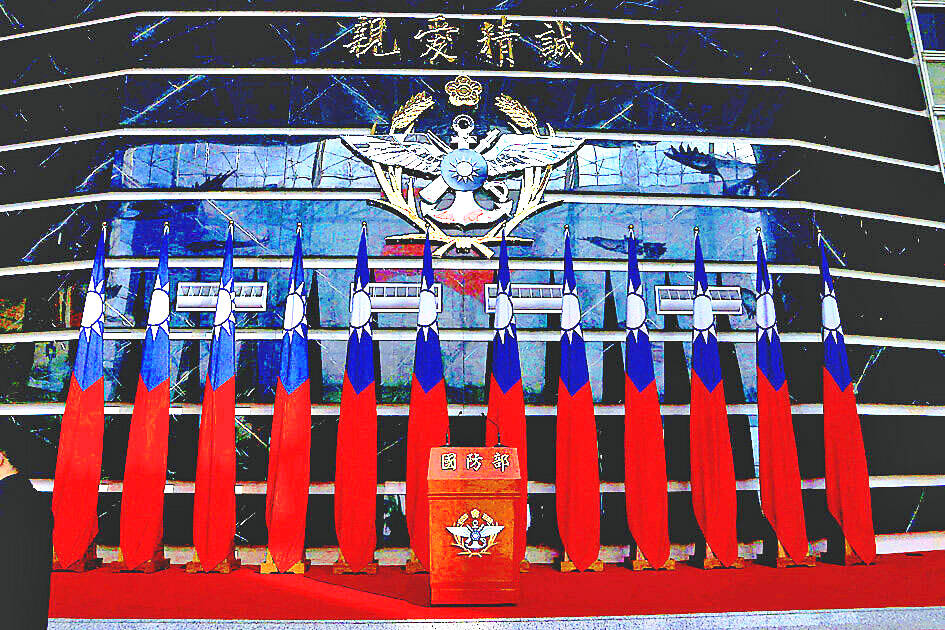A drone countermeasure system to be used by the army would be completed by the end of this year at a cost of NT$988 million (US$30.1 million), the Ministry of National Defense said.
The contract was won by Tron Future Tech Inc (創未來科技) after previously failed bids, the ministry said on Friday, adding that the company would finish production of the systems by the end of the year, with initial deployments in Kinmen and Lienchiang countries, as well as at the army’s base in Taoyuan’s Longtan District (龍潭).
China’s incursions into airspace and waters near Taiwan have increasingly included drone activity, which necessitates actions to protect national security, the ministry said.

Photo: Ann Wang, Reuters
“Small and medium-sized drones frequently harass our outlying islands, and there have even been drone swarm attacks to test the army’s defense capabilities,” it said.
In addition to the army’s drone countermeasure system, the ministry said it is also planning to purchase a “remote control drone defense system” for the air force, which has a budget of NT$4.35 billion.
The ministry would commission the Chung-Shan Institute of Science and Technology to build the system and purchase jammers, it said.
“The system would be aimed at defending against incursions by Chinese drones, as well as protecting bases, ports, airports and other such areas,” the ministry said.
Drones and anti-drone defense systems would eventually be installed at outlying islands, isolated military camps, high-mountain facilities, missile-launch positions and other sensitive areas, it added.
The systems would allow the military to conduct reconnaissance and interfere with intruder uncrewed aerial vehicles, improve base security, maintain flight safety, and provide better wartime defense and combat capabilities, the ministry said.
Prior to winning the bid for the drone countermeasure system, Tron Future had taken its system to test sites in Yilan and Kinmen counties, a source said.
“The military was not satisfied with the initial tests, so it asked the contractor to make improvements, which it did, and it finally met the ministry’s requirements,” they said.
According to Tron Future’s Web site its anti-drone system is comprised of three components: a radar, a jammer and an interceptor drone.
The interceptor “has a radar and image seeker with choices of explosive or non-destructive warheads for dealing with different situations. [It] flies back to the desired location when an intercept mission is complete,” it says.

US President Donald Trump said "it’s up to" Chinese President Xi Jinping (習近平) what China does on Taiwan, but that he would be "very unhappy" with a change in the "status quo," the New York Times said in an interview published yesterday. Xi "considers it to be a part of China, and that’s up to him what he’s going to be doing," Trump told the newspaper on Wednesday. "But I’ve expressed to him that I would be very unhappy if he did that, and I don’t think he’ll do that," he added. "I hope he doesn’t do that." Trump made the comments in

NOT AN OPENING: Trump’s violation of international law does not affect China’s consideration in attacking Taiwan; Beijing lacks capability, not precedent, an official said Taiwanese officials see the US’ capture of the president of Venezuela as a powerful deterrent to Beijing’s aggression and a timely reminder of the US’ ability to defeat militaries equipped with Chinese-made weapons. The strikes that toppled Venezuelan President Nicolas Maduro signaled to authoritarian leaders, including Chinese President Xi Jinping (習近平), US President Donald Trump’s willingness to use military might for international affairs core to US interests, one senior official in Taipei’s security circle said. That reassured Taiwan, the person said. Taipei has also dismissed the idea that Trump’s apparent violation of international law could embolden Beijing, said the official, who was not

A cold surge advisory was today issued for 18 cities and counties across Taiwan, with temperatures of below 10°C forecast during the day and into tonight, the Central Weather Administration (CWA) said. New Taipei City, Taipei, Taoyuan and Hsinchu, Miaoli and Yilan counties are expected to experience sustained temperatures of 10°C or lower, the CWA said. Temperatures are likely to temporarily drop below 10°C in most other areas, except Taitung, Pingtung, Penghu and Lienchiang (Matsu) counties, CWA data showed. The cold weather is being caused by a strong continental cold air mass, combined with radiative cooling, a process in which heat escapes from

Snow this morning fell on Alishan for the first time in seven years, as a strong continental cold air mass sent temperatures plunging across Taiwan, the Central Weather Administration (CWA) said. The Alishan weather station, located at an elevation of about 2,200m in central Taiwan, recorded snowfall from 8:55am to 9:15am, when the temperature dropped to about 1°C, the CWA said. With increased moisture and low temperatures in the high-altitude Alishan area, the conditions were favorable for snow, CWA forecaster Tsai Yi-chi (蔡伊其) said. The last time snow fell at the Alishan weather station was on Jan. 10, 2018, while graupel fell there